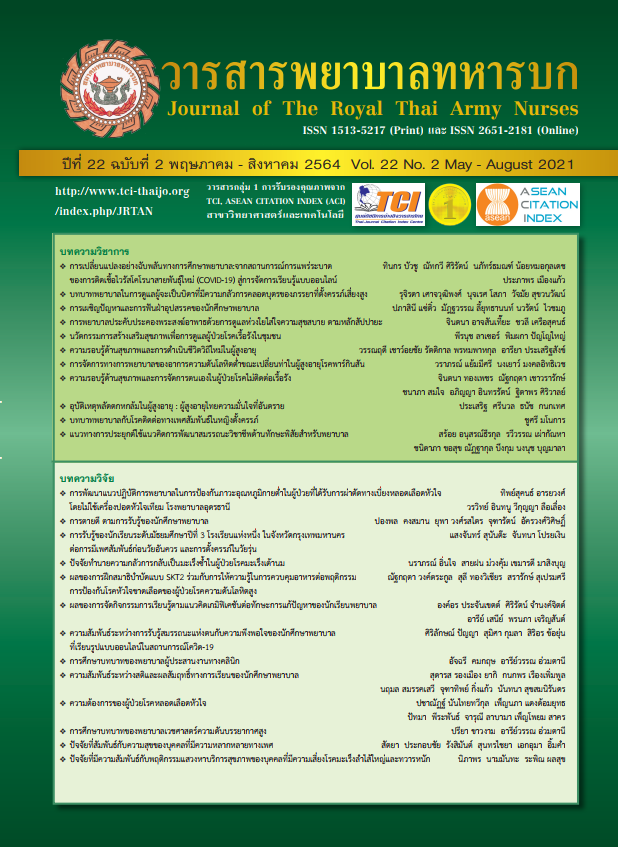The Development of NICU-ISBAR Technique Form for Hand-off for Nursing Students
Keywords:
ISBAR, Hand-off, Neonatal Intensive Care Unit, NICU, Nursing StudentAbstract
The quasi-experimental research aimed to develop NICU-ISBAR technique form for hand-off for nursing students and to compare Knowledge, attitude and practice of nursing students before and after using the NICU- ISBAR. The subjects were 32 student nurses who practiced in the neonatal intensive care unit (NICU) in the Pediatric nursing practicum course. The research instruments consisted of the ISBAR training plan, 2-scenario for NICU-ISBAR practice, draft edition of NICU-ISBAR and NICU-ISBAR efficiency questionnaires. This research questionnaires has been verified for content validity by an experts have Index of Item-Objective Congruence (IOC) ranged from 0.67 to 1.00. Reliability of the questionnaires were conducted by Cronbach’s Alpha Coefficient at 0.96. Data were analyzed by frequency, percentage, mean, standard deviation and dependent t-test.
The research revealed the following results: 1) The data sheet according to ISBAR technique at the Neonatal Intensive Care Center (NICU- ISBAR) was used two-sided horizontal A4 size paper. It was divided into sections according to ISBAR technique. It was identify, background, and recommendation divided one data per segment and divided the situation and assessment data into 4 subsections according to the number of days students practice each week. 2) The mean scores of knowledge, attitude and skills in hand-off were significantly higher after using NICU-ISBAR (p<.05)
Downloads
References
Gausvik C, Lautar A, Miller L, Pallerla H, Schlaudecker J. Structured nursing communication on interdisciplinary acute care teams improves perceptions of safety, efficiency, understanding of care plan and teamwork as well as job satisfaction. Journal of Multidisciplinary Healthcare. 2015;(8):33-7.
Weaver SJ, Lubomksi LH, Wilson RF, Pfoh ER, Martinez KA, Dy SM. Promoting a culture of safety as a patient safety strategy: a systematic review. Annals of Internal Medicine. 2013;158(5Pt2):369-74.
The Healthcare Accreditation Institute (Public Organization). Patient Safety Goals: SIMPLE Thailand 2018. Bangkok: Famous and Successful; 2018. (in Thai)
Dunsford J. Structured communication: improving patient safety with SBAR [abstract]. Nurse Women’s Health. 2009;13(5):384-90.
Kotsakis A. Mercer K. Mohseni-Bod H. Gaiteiro R. Agbeko, R. The development and implementation of an inter-professional simulation based pediatric acute care curriculum for ward health care providers [abstract]. Journal of Interprofessional Care. 2015;29(4):392-4.
Charuwanno R. Wongchanglor J. Pongsananurak T. Effects of Teaching by Using SBAR Technique on Knowledge Attitude and Practice in Taking and Giving Report Among Nursing Students. J Royal Thai Army Nurses. 2014;15(3):390-7. (in Thai)
Wang W. Liang Z. Blazeck A. Greene B. Improving Chinese nursing students’ communication skills by utilizing video-stimulated recall and role-play case scenarios to introduce them to the SBAR technique. Nurse Educator. 2015;35(7):881-7.
Davis RL. Using SBAR as a Preconference Reporting Tool for Nursing Students [abstract]. Nurse Educator. 2016;41(2):74.
Sinthuchai S. Ubolwan K. Fidelity Simulation Based Learning: Implementation to Learning and Teaching Management. J Royal Thai Army Nurses. 2017;18(1):29-38. (in Thai)
Sinthuchai S. Ubolwan K. Boonsin S. Effects of High-Fidelity Simulation Based Learning on Knowledge, Satisfaction, and Self-Confdence among the Fourth Year Nursing Students in Comprehensive Nursing Care Practicum. Rama Nurs J. 2017;23(1):113-27. (in Thai)
Thanaroj S. Keadthong W. Sueamak W. Development of instructional package on the Topic Nursing Teamwork with Simulation based learning for nursing students. Journal of Health Research and Innovation. 2019; 2(1):58-72. (in Thai)
Tantalanukul S. Development of Instructional Model with Simulated Situations to Enhance Performance in Primary Medical Care of Nursing Students. Boromarajonani College of Nursing, Uttaradit Journal. 2018;(Suppl): 124-36. (in Thai)
Downloads
Published
How to Cite
Issue
Section
License
บทความหรือข้อคิดเห็นใดใดที่ปรากฏในวารสารพยาบาลทหารบกเป็นวรรณกรรมของผู้เขียน ซึ่งบรรณาธิการหรือสมาคมพยาบาลทหารบก ไม่จำเป็นต้องเห็นด้วย
บทความที่ได้รับการตีพิมพ์เป็นลิขสิทธิ์ของวารสารพยาบาลทหารบก
The ideas and opinions expressed in the Journal of The Royal Thai Army Nurses are those of the authors and not necessarily those
of the editor or Royal Thai Army Nurses Association.






